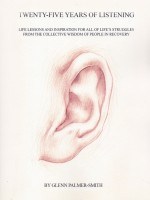By Dave W.
My goodness we are an efficient bunch in AA. Got it all nailed down. Nothing new under the sun. Our omnipotent Big Book laid it all out for us in 1939. What a blessing. We do not have to over complicate our recovery and our lives with the foolish notion that new knowledge about alcoholism and addiction may have occurred over the past eighty plus years.
I am shaking my head at the absurdity of the above paragraph largely because there seems to be a sizable number of our fellowship that actually subscribes to that belief. For myself, I gave up the idea early in my struggles that I could fit the causes and effects of my alcoholism into the neat little package that is the suggested AA program of recovery.
I am not suggesting that working through the twelve steps is a fruitless endeavour. A huge part of recovery is admitting powerlessness over an addictive toxic poison that damages and destroys our bodies, brains, and spirits. In the early stages of abstinence, most of us are left with having to undo the harm to our lives and relationships that our drinking caused. The steps provide a roadmap for cleaning up our messes and safeguarding against falling back into old destructive patterns.
 The foundational base of the AA triangle is labeled “recovery”. As a starting point, that makes complete sense to me. Without recovery from alcohol addiction, we are of little use to others in the fellowship and in our personal lives. What I would challenge however is the AA twelve step model as being a one size fits everyone stand-alone method of recovery.
The foundational base of the AA triangle is labeled “recovery”. As a starting point, that makes complete sense to me. Without recovery from alcohol addiction, we are of little use to others in the fellowship and in our personal lives. What I would challenge however is the AA twelve step model as being a one size fits everyone stand-alone method of recovery.
AA identifies the twelve steps as its core program. The Big Book states people who fail do so because they either cannot or will not give themselves over to this “simple program”. The “A Newcomer Asks” pamphlet recommends to those new to begin the steps and study the Big Book. At many meetings, newcomers are encouraged and even pressured to find a sponsor and begin step work ASAP.
Sponsorship seems to go hand in hand with step work. I have cringed sitting in meetings watching would be sponsors stand up at meetings to offer their guidance and wisdom to a person they have never met before and know nothing about. The visual has a very intimidating look to it. Not to mention the fact that the true motivation of the prospective sponsor may have more to do with the sponsors needs than that of the person they are offering to help.
Strangers sponsoring strangers to any meaningful level of depth makes about as much sense to me as having a medical problem and approaching someone on the street for help hoping they have suffered from the same malady at some point in their life. We would not be asked to give other areas of our health or welfare over to a total stranger who although may understand their own reasons for drinking, may be completely lost in understanding our own unique core problems. It is perilous to give that power to an individual simply because they have accumulated X number of sober days.
The power exchange that can occur in sponsorship has always made me uncomfortable. Like the steps, it is promoted as a must in some meetings. There are individuals in AA who have no business taking on the role of sponsor. Many lack the basic skills and mental health required to assist another in what can be a harrowing and painful journey of self discovery. I have heard stories of sponsors “firing” the people they sponsor over ludicrous reasons such as unwillingness to pray a certain way, a disbelief in god, an unwillingness to call in every day, or a rejected demand that the newly sober person also become a sponsor. At its worst, sponsorship has the potential danger of being a violation of a person’s boundaries, safety and freedom of choice. Although I have heard of many positive outcomes of sponsorship, I am convinced in some cases the relationship represents an opportunity to have power and control over another person.
To reiterate, I am not opposed to either step work or sponsorship and I am not advocating we put an end to either. I do however challenge the narrowness of relying on these tools as our primary means of recovery. They seem to occupy the lions share of attention in AA. Traditional meetings revolve around the steps and you really feel out of place in many meetings if you are choosing a different path for your recovery. At times I have felt like I am doing something wrong if I do not have a sponsor or have not worked the steps.
In traditional meetings members learn to talk in AA speak, a jargon unique to the fellowship. I find people will often parrot what they have heard from other members and what they have read in the literature. AA is overflowing with cliches and slogans. People’s shares frequently sound robotic and have a people pleasing quality to them. What gets lost in the mix is individual spontaneity and a feeling that is it not advisable to go off script if your own experiences are too contrary to the prescribed program.
Another scared cow in AA is a requirement to identify and have a higher power. It appears to be such an essential component of recovery that even a doorknob can suffice. The original intent seems to have been to allow non-believers some latitude in selecting a non deity as a higher power under the assumption they will eventually come to know and love god. I have sat in secular meetings and heard sober alcoholics reject the need to embrace both god and a higher power. I have personally never seen the need to cling to this construct, I do not understand the benefit of going through the deliberate exercise of identifying one. Like much in recovery, if it develops organically, it can be useful, but we do not have to hit people over the head with the idea of identifying their own personal saviour.
My personal time in secular AA is night and day to what I experience in traditional meetings. In secular meetings we are breaking down the barriers of what is appropriate discussion. Many people struggle with cross addictions. I find it impossible to separate my alcoholism from other addictive impulses. I am convinced the same neuro pathways in my brain that led to my drinking I have used in other destructive behaviours. I find it very therapeutic and healing to share my daily battles with non-alcoholic addictions and obsessions. Speaking of them in meetings helps keep me sober. I have never had to struggle with the horrors of heroin or cocaine addiction on top of alcoholism. Yet I am not about to tell someone “this is AA, we don’t talk about that here.”
In the secular rooms we are not afraid to go off convention and introduce non-conference approved readings in our meetings. There is an amazing amount of wisdom in our gatherings. Stale repetitive readings are hardly an efficient means to tap into this knowledge. When people feel safe to express themselves without fear of ridicule or harassment they give freely of their personal experiences. No one is going to be damaged or their sobriety lost if they hear ideas that are not GSO approved.
Despite how far we may stray from the traditional meeting format that seems to dominate AA, we never forget why it is we are meeting. We are collectively struggling with a life-threatening adversary. That reality always seems to bring us back to our main purpose.
More and more I conclude that the definition of recovery is unique to the individual. I believe recovery to be an individualized path of self discovery. Mine is a life-long journey and it has become as much of my uniqueness as any other area of my life. I could not follow someone else’s path any more than they could follow mine. I have my own unique set of challenges and life experiences. We can draw wisdom and insights into our own journeys from others experiences but we will never duplicate their lives. I find people in AA to be incredibly creative in overcoming seemingly insurmountable challenges and I have learned so much from them. The goal for me is to fit their wisdom and discoveries into my own life.
David is a sixty two year-old agnostic alcoholic whose drinking career began late in life after growing up with an alcoholic father. After twelve years of daily drinking, he came to believe that a substance greater than himself trapped him in the same addictive cycle that had trapped various members of his family on both sides. Desperate for outside help, he found secular AA on-line in 2018 and was able to avoid the conflict with religion and a mandatory belief in god that traditional AA insists on imposing on members. His home group is Beyond Belief Toronto and this month – December 2020 – he is two years sober.
The post Defining Recovery in AA in the 21st Century first appeared on AA Agnostica.
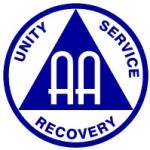
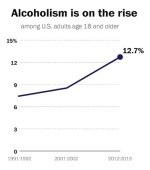
 Americans would be justified in treating alcohol with the same wariness they have toward other drugs. Beyond how it tastes and feels, there’s very little good to say about the health impacts of booze. The idea that a glass or two of red wine a day is healthy is now considered dubious. At best, slight heart-health benefits are associated with moderate drinking, and most health experts say you shouldn’t start drinking for the health benefits if you don’t drink already. As one major study recently put it, “Our results show that the safest level of drinking is none.”
Americans would be justified in treating alcohol with the same wariness they have toward other drugs. Beyond how it tastes and feels, there’s very little good to say about the health impacts of booze. The idea that a glass or two of red wine a day is healthy is now considered dubious. At best, slight heart-health benefits are associated with moderate drinking, and most health experts say you shouldn’t start drinking for the health benefits if you don’t drink already. As one major study recently put it, “Our results show that the safest level of drinking is none.” Meanwhile, the National Beer Wholesalers Association, which is listed as the top campaign contributor to political candidates in the “beer, wine, and liquor” category by the Center for Responsive Politics, has lobbied for a bill that would, among other things, reduce excise taxes on beer and spirits.
Meanwhile, the National Beer Wholesalers Association, which is listed as the top campaign contributor to political candidates in the “beer, wine, and liquor” category by the Center for Responsive Politics, has lobbied for a bill that would, among other things, reduce excise taxes on beer and spirits.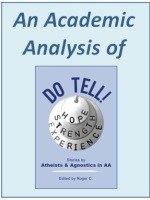

![Do Tell! [Front Cover]](https://nrdblogs.nationalrehabdirectory.net/wp-content/uploads/2020/09/Do-Tell-Full-Blue-Front-Cover-200-FRAMED.jpg) This is a chapter from the book: Do Tell! Stories by Atheists and Agnostics in AA.
This is a chapter from the book: Do Tell! Stories by Atheists and Agnostics in AA. 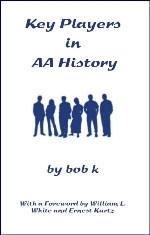


 In addition to being an accomplished chronicler of what he has heard at meetings, Glenn is also a gifted artist; scattered copiously throughout the written pages are pencil sketches he’s drawn of alcoholics at the New York City meetings he attends, being careful, he notes, to protect their anonymity.
In addition to being an accomplished chronicler of what he has heard at meetings, Glenn is also a gifted artist; scattered copiously throughout the written pages are pencil sketches he’s drawn of alcoholics at the New York City meetings he attends, being careful, he notes, to protect their anonymity.